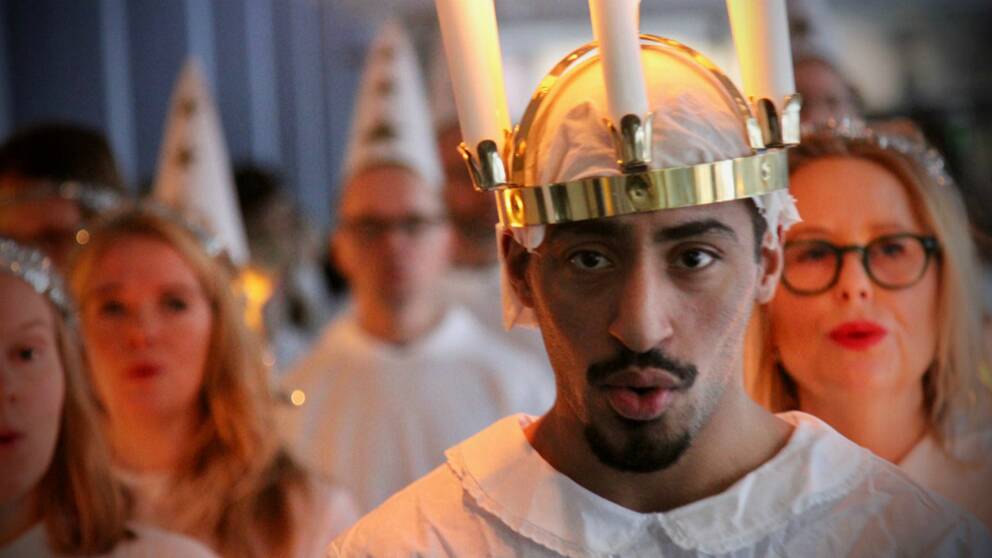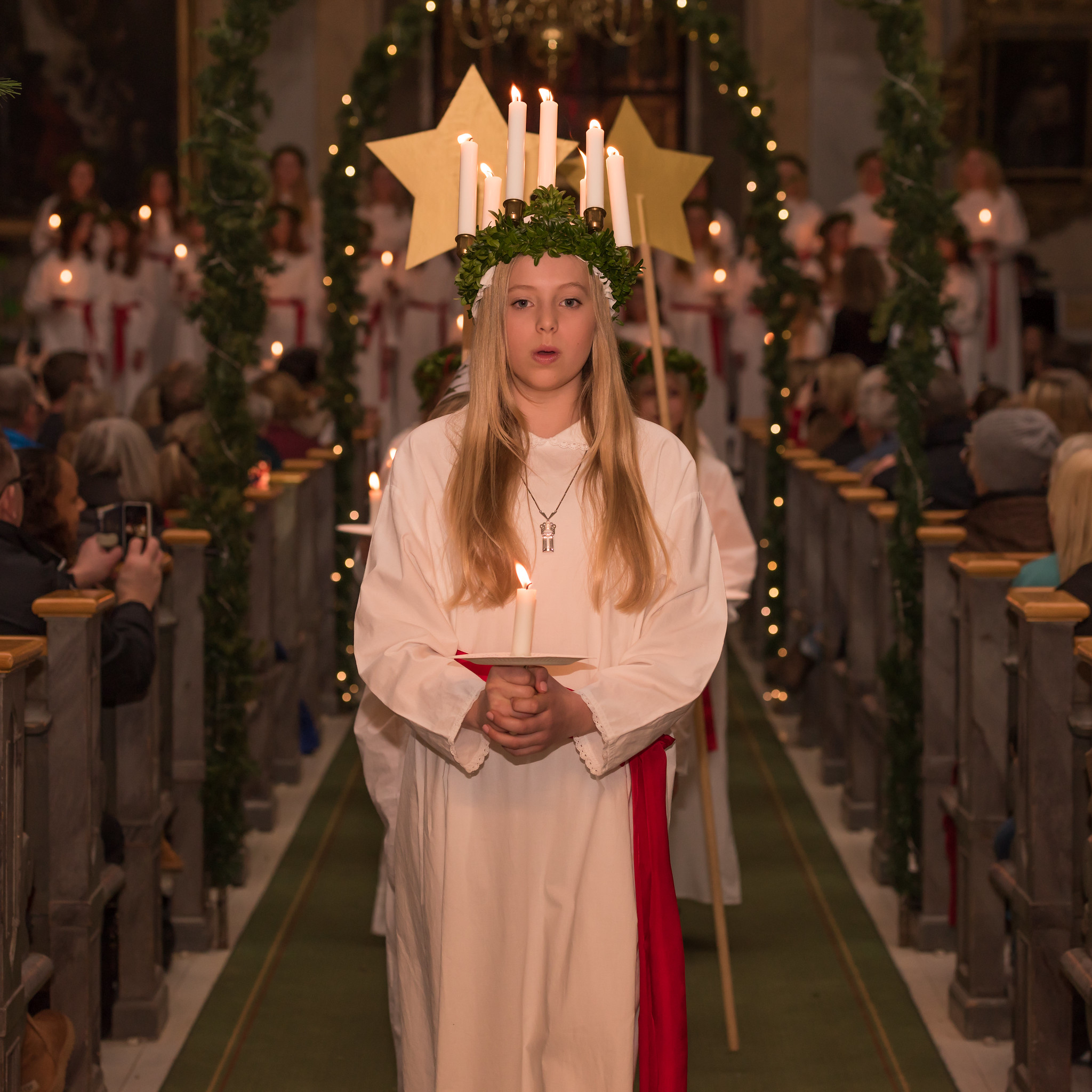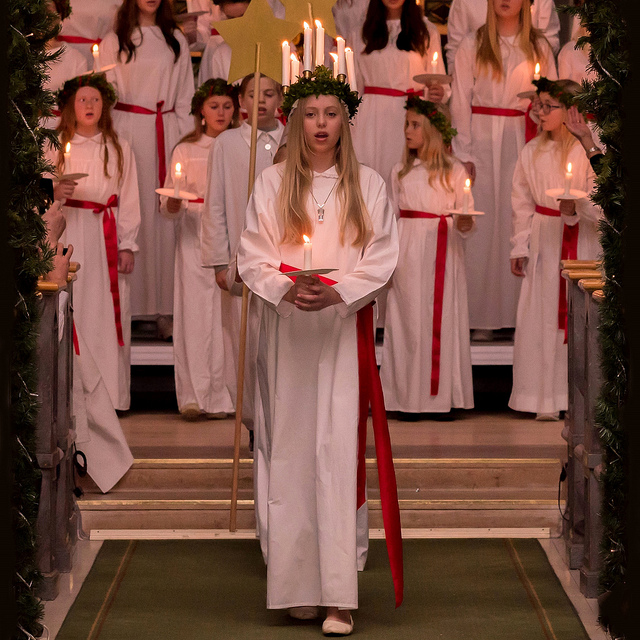|
|
Post by Admin on Dec 26, 2018 18:44:15 GMT
Lucia is a pagan tradition in Sweden where we bring light to the darkness. Since many years back I have always gone out in the middle of the Lucia night to light up hundreds of candles in the forest, with the intention to spread light into the world.  Lucia is celebrated on 13 December. Sankta Lucia (St. Lucy’s Day) is celebrated most commonly in Scandinavia, where it is a major feast day. Here in Scandinavia, she is represented as a woman in a white dress and red sash with a crown or wreath of candles on her head. In Sweden, girls dressed as Lucia (Lucy) carry rolls and cookies in procession as songs are sung. Boys take part in the procession as well, playing different roles associated with Christmas.  Åhléns, a Swedish department store chain, suspended a Lucia campaign after racist comments were directed against a boy who was in the ad. The day of Saint Lucia in Sweden retains pagan and pre-Christian midwinter elements, predating the adoption of Christianity in that region. St. Lucia's Day, which is a pagan festival of lights celebrated in Sweden, is more important than Christmas for most Swedes. Almost 80% of Swedes are not religious and the Nordic nation is the least religious in the West because of their pagan roots, which is similar to how the Japanese treat Buddhism, an Indian cultural import.  The Swedes celebrate Lucia on December 13th and the occasion involves a procession led by a girl who wears candles on her head (representing Saint Lucia or Saint Lucy as she is usually known in English) along with a long white gown, singing songs to honour St. Lucy and mark the long nights of the Scandinavian winter.  However, interest in finding a local girl to become a Lucia is becoming increasingly difficult. Swedish Radio's Culture News reported in 2012 that the number of municipalities without an official Lucia was as high as 30 percent due to the popular resistance toward a beauty pageant. |
|
|
|
Post by Admin on Dec 27, 2018 18:07:10 GMT
Excerpts from SVT and TV4 broadcasts from Lucia 2015. Participating are students from music classes in Gothenburg and Växjö. Short background: Lucia (Saint Lucy's Day) is celebrated in Scandinavia December 13. In Scandinavia (as late as until the mid 18th century) this night was the longest night of the year, coinciding with Winter Solstice, this was due to the Julian Calendar being employed at that time.  In pre-Christian Sweden Lussinatta, the Lussi Night, was marked this night. Then Lussi, a female being with evil traits, like a female demon or witch, was said to ride through the air with her followers, called Lussiferda. This itself might be an echo of the myth of the Wild Hunt, called Oskoreia in Scandinavia, found across Northern, Western and Central Europe. Between Lussi Night and Yule, trolls and evil spirits, in some accounts also the spirits of the dead, were thought to be active outside. It was believed to be particularly dangerous to be out during Lussi Night. According to tradition, children who had done mischief had to take special care, since Lussi could come down through the chimney and take them away, and certain tasks of work in the preparation for Yule had to be finished, or else the Lussi would come to punish the household. The tradition of Lussevaka – to stay awake through the Lussinatt to guard oneself and the household against evil, has found a modern form through throwing parties until daybreak. Later, Christian missionaries arrived in Scandinavia to evangelize the local population, carrying the commemoration of Saint Lucy (Lucia of Syracuse), a young Christian martyr who died during the Diocletianic Persecution, and this story of a young girl bringing light in the midst of darkness no doubt held great meaning for people who, in the midst of a North Sea December, were longing for the relief of warmth and light.  Songs: Luciasången - Santa Lucia 00:00 Betlehems Stjärna - Star of Bethlehem 02:16 Strålande Helgonfé - Luminous Saint 05:20 Rederliga Män - Orderly Men 09:16 Så Mörk Är Natten - How Dark Is The Night 12:24 Medeltida Mariavisa - Medieval Maria Ballad 14:33 Koppången 18:05 Jul, Jul, Strålande Jul - Yule, Yule, Glorious Yule 21:56 Luciasången - Santa Lucia (in Italian) 24:39 |
|
|
|
Post by Admin on Dec 28, 2018 17:41:31 GMT
In 2016, Åhléns suspended a Lucia campaign after hundreds of racist and hateful comments were directed against a boy who was in the ad. It got Seif Aldaffai at Enskede Farm's high school who wanted to become Lucia. - This thing with lucia is probably my thing, says Seif Aldaffai, when we meet him after the Lucia celebration.  It was after Åhlens talked about Lucia campaign that Seif Aldaffai felt he wanted to show that everyone could be Lucia. He searched the school's choir and asked to be Lucia. - For me, this is racism, that many were opposed to this little guy becoming Lucia. I actually did it most to fight against racism, says Seif Aldaffai.  |
|
|
|
Post by Admin on Jan 1, 2019 18:30:13 GMT
 "It went against my fear" Enskede Farm's gymnasium shared a film from Lucia celebration on social media and Seif Aldaffai is happy for the positive response he received. - It feels good actually that anyone can be Lucia, it doesn't matter which sex you have or which country you come from.  But it was not obvious to him to ask for Luciakronan. - You have a pride as a guy and I first thought "it should not be so" but I like to go against my fear and just do it. For me this is fucking brave, I did it and it was a nice result, I got nice comments. |
|
|
|
Post by Admin on Jan 2, 2019 18:11:54 GMT
 "Everyone should be a Lucia" At Enskede Farm's high school, the exercises began before Lucia already after the autumn holidays and the choir, which mainly consists of teachers, has long tried to get the students to participate. - We had not decided that we would find just one guy but it felt like a good opportunity, there should be a chance for everyone to be Lucia. It feels great that Seif was so incredibly serious, he took his mission very seriously. He said he had dreamed about this, says music teacher Linnea Stensdotter, who led the Lucia training. |
|











